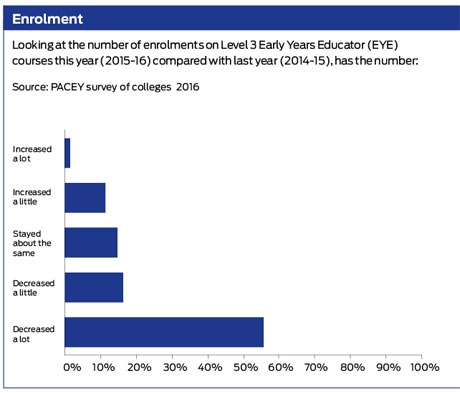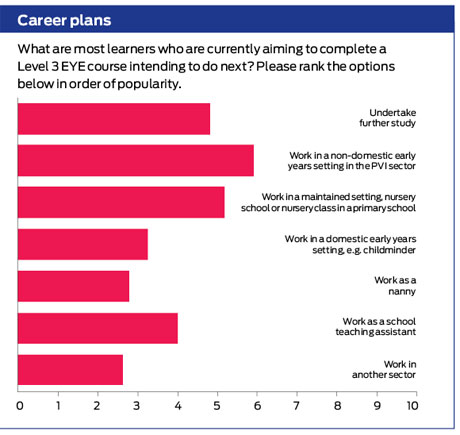
A survey by PACEY of 75 leaders at further education colleges across England reveals nearly three-quarters of respondents (73 per cent) are in favour of scrapping the GCSE requirement for maths and English at grade C and above in favour of equivalent functional skills for learners aiming to gain Level 3 EYE qualifications.
The survey was carried out in response to widely perceived sector-wide recruitment issues to provide evidence to the Department for Education on the impact of GCSE requirements on the number of students qualifying as EYEs.
Ninety per cent of respondents believe that more Level 3 learners would gain EYE qualifications if functional skills equivalents to maths and English were allowed.
In the survey, 72 per cent reported that the number of students enrolled on Level 3 EYE courses has fallen in 2015-16 compared with 2014-15 (see chart, below).
Meanwhile, 74 per cent of respondents believe that if functional skills equivalents in maths and English were allowed in place of GCSEs, ‘many more’ Level 2 learners would go on to Level 3; 20 per cent think ‘some more’ would do this.

‘PART OF THE PUZZLE’
The survey comes just after childcare minister Sam Gyimah’s promise to review GCSE requirements at Level 3 alongside the workforce strategy at the National Day Nurseries Association annual conference. During his speech he acknowledged that consultations with the sector had shown that ‘the most common issue in terms of attracting staff at Level 2 and 3 is the introduction of the GCSE requirement.’
Liz Bayram, chief executive of PACEY, said, ‘We want the review to be quick and the issue of functional skills to be finally on the agenda.’
The GCSE rule has had the opposite effect of recruiting high-quality candidates, she said, because those students that have GCSEs are going into other areas.
Bayram said, ‘Individuals that would have normally done EYE are going off to do something else – many are using it [GCSEs] as a fast track into teaching.
‘The idea that it would adjust over time as more people have GCSE maths is not working because it is seen as a lesser qualification.’
She added, ‘What we’re picking up is that lots of people are stuck at Level 2 and can’t progress.
‘It’s important that functional skills is thought about – it’s part of the puzzle. We’re really pleased about the review. We’re very clear that we want functional skills as an equivalent [to GCSEs].’
‘Having GCSEs as an arbitrary measure of success just isn’t working. There’s a very clear drop-off in numbers taking EYE – it will affect the 30 hours. From our point of view, many settings will be struggling to offer the 30 hours.’
She also pointed out that more than half of respondents felt that the early years was a less attractive career option than in the past, despite the work that has gone into professionalising the sector.
‘We’re not able to persuade people to take EYE courses because they have better options. We need to tackle career progression. The early years sector is still poorly paid,’ Ms Bayram said. ‘It’s not like nursing, social care or accountancy where there are pay scales. QTS [qualified teacher status] needs to be resolved, as part of a proper approach to career progression. We need to be able to show people where their future lies because the route is not clear.’

Source: PACEY survey of colleges 2016
CACHE – the Council for Awards in Care, Health and Education – says there is as much as a 94 per cent reduction in students starting Level 3 in some colleges. Julie Hyde, executive director of CACHE, said the survey findings ‘support what the sector has been saying’, and that it is clear that functional skills should be accepted as an alternative to GCSEs.
‘Absolutely,’ she said. ‘They are accepted on all other apprenticeship frameworks except childcare Level 3. In every other sector – in health and social care, and in support teaching and learning, which is the teaching assistant qualification.
‘What we’re looking for is parity. We want functional skills to be accepted. All we’re asking is for them to be added to the NCTL equivalency list; for functional skills to be included as with all the other apprenticeships. Functional skills provide contextualised learning in maths and English for application in the workplace.’
Ms Hyde said that functional skills should be accepted for English, as well as maths, in order for the sector to provide the workforce who will support the Government to deliver the 30 hours free childcare. Not accepting functional skills was a barrier that could so easily be removed, she said.
‘We have to have parity for English and maths. We don’t have all young people with GCSEs but we do have an alternative available now. We have to have both. The sector can’t fix in a short time what 11 years of schooling have failed to achieve.’
She added, ‘One of the key things is that there is no progression from Level 2 to Level 3. We have a lot of learners who have done Level 2 and can’t progress. It’s a travesty – we want them to be able to progress in their career.’
The GCSE rules were brought in on 1 September 2014, meaning that there is now a significant amount of data showing a major reduction in learners being able to progress and start their Level 3 EYE qualifications.
Ms Hyde commented, ‘The current situation is not improving quality, but potentially reducing it as this requirement is promoting a Level 2 workforce. It’s not enabling. We want to be enabling progression.
‘We want the review to happen quickly, for those learners wanting to start this September. Many training providers won’t start learners on Level 3 if they don’t have GCSEs.’
She added, ‘We will have a significant reduction in the workforce for 2016/17 unless this is amended now.’
CASE STUDY – COLLEGE CHILDCARE PROGRAMME MANAGER*
‘Recruitment has been a problem at Level 3. We used to operate four groups of around 20 learners and we’re looking at about two groups from September on the CACHE Level 3 Early Years Educator. It’s not just GCSE maths that’s the problem – schools are holding on to learners with higher grades as well, because they’re choosing to stay on and do A levels.
‘To my mind the Government spent thousands of pounds trying to convince businesses that functional skills was a worthwhile qualification and now they won’t even accept it themselves.
‘We have two years’ worth of Level 2 people who could have been excellent Level 3 practitioners but they don’t have the GCSEs.
‘The key aspect of Level 3 is that students have to have very strong English skills. Predominately learners have that. They are often able to do maths as functional skills because it’s more practical reasoning, an applied method. Functional skills for English and maths is more than acceptable for a Level 3 learner.
‘What the Government has done is make our learners come to a complete stop.
‘From September all our EYE students will have to have C grades. The EYE is a two-year qualification, but the maths GCSE only runs from September to June – it’s too much for them to do GCSE maths in nine months. We would rather students came to us with it.
‘The Government needs to be flexible and accept functional skills and realise that they’re stopping very skilled people coming into a job market that already has problems recruiting because of poor pay.
‘It’s putting a brick wall in front of everyone’s education.
‘You need an education in early years but there’s more than one way to do it.’
*wished to remain anonymous









